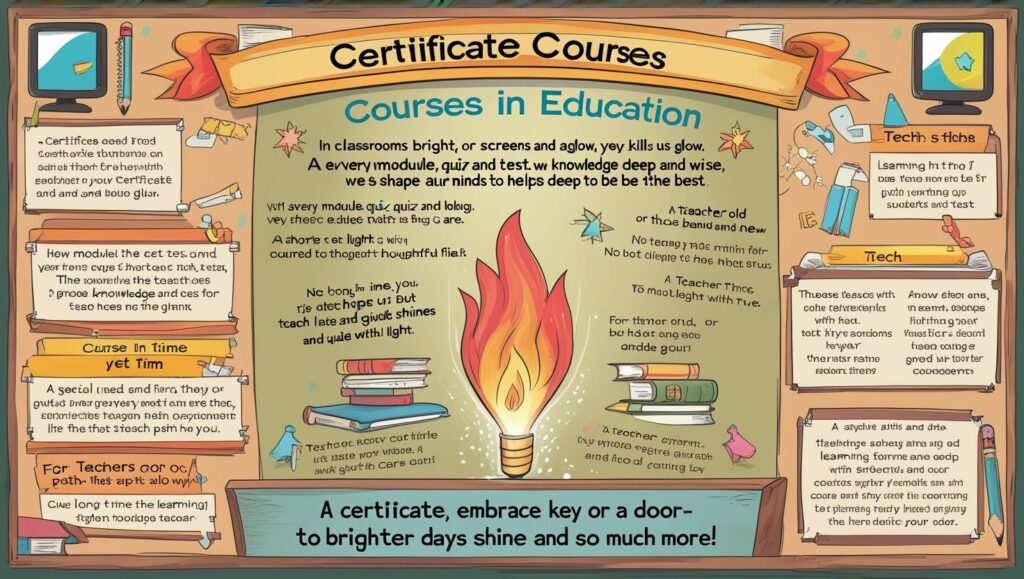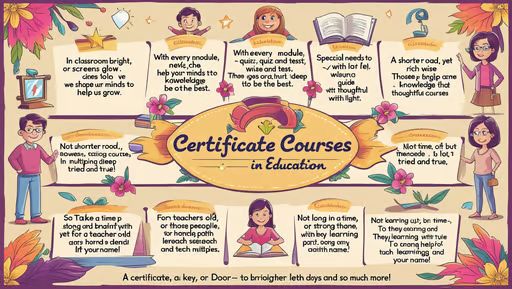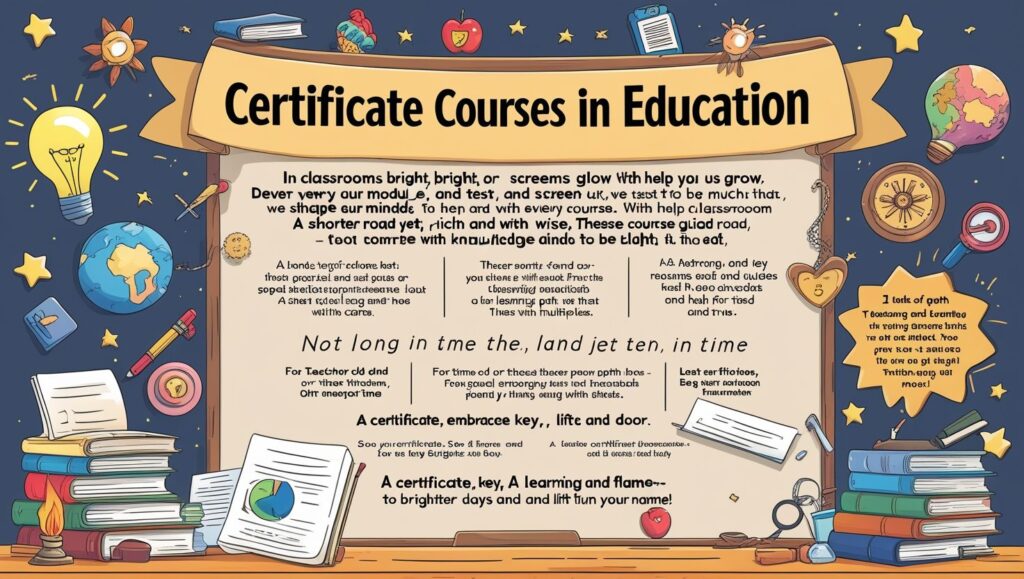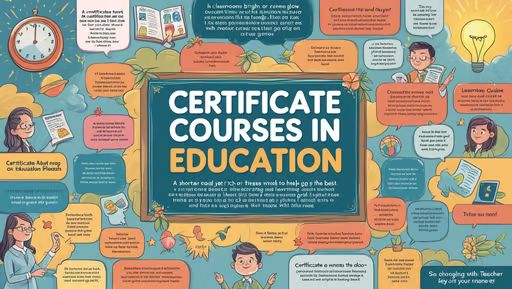Certificate Courses in Education, In the evolving landscape of education, continuous professional development has become essential for educators. With technological advancements, policy changes, and diverse learning needs, traditional teacher education is no longer sufficient to address the dynamic requirements of the classroom. Certificate courses in education offer a flexible, efficient, and targeted approach to upskill educators, administrators, and aspiring professionals. These courses are designed to deepen knowledge, enhance teaching practices, and promote career advancement.
What Are Certificate Courses in Education?
Certificate courses in education are short-term, specialized academic programs aimed at equipping participants with practical knowledge and skills in specific areas of education. These can include classroom management, early childhood education, curriculum development, special education, educational technology, assessment methods, and more. Unlike degree programs, certificate courses typically range from a few weeks to a year and focus on specific competencies rather than broad academic content.
These courses are offered by universities, teacher training institutes, professional organizations, and increasingly through online platforms. They serve a wide spectrum of participants—current teachers, aspiring educators, school administrators, curriculum planners, and even parents interested in educational psychology.
Importance of Certificate Courses in Education
1. Professional Growth and Skill Enhancement
Certificate courses help educators stay current with the latest pedagogical methods, teaching technologies, and educational trends. For instance, a teacher with a background in science may pursue a certificate in educational technology to learn how to incorporate digital tools in science instruction. This not only enhances classroom experience but also increases employability.
2. Specialization in Specific Fields
Education is a vast field with many niches. Certificate programs allow educators to specialize in areas like inclusive education, Montessori methods, ESL (English as a Second Language), STEM education, or educational leadership. Specialization opens new avenues in career and contributes to better learning outcomes for students.
3. Flexible Learning
Most certificate courses are designed with flexibility in mind. Many are available online or in hybrid modes, making it easier for working professionals to balance their job responsibilities with academic pursuits. Self-paced modules, recorded lectures, and online assessments make learning more accessible and convenient.
4. Affordability and Time-Efficiency
Compared to full-time degree programs, certificate courses are cost-effective and time-efficient. They offer high returns on investment, especially when targeted towards areas of high demand in education.
5. Credential for Career Advancement
Possessing additional certifications often plays a decisive role during recruitment or promotion. A certificate in school management or curriculum development, for instance, might strengthen an application for a principal or coordinator role.

Types of Certificate Courses in Education
1. Early Childhood Education
This course focuses on teaching children from birth to around eight years old. It covers child development, play-based learning, health and safety, and curriculum planning. It is ideal for preschool teachers, daycare workers, and early learning facilitators.
2. Special Education
Special education certificate courses prepare educators to work with children who have diverse learning needs, including physical disabilities, learning disabilities, autism, or emotional challenges. Topics include IEPs (Individualized Education Programs), behavior management, and assistive technologies.
3. Educational Leadership and Administration
These courses are for those aiming for leadership roles within schools or educational institutions. They include modules on school management, human resource development, leadership styles, and policy implementation.
4. Curriculum Design and Development
Curriculum specialists play a crucial role in shaping the content delivered in classrooms. Certificate programs in this field focus on instructional design, curriculum mapping, assessment alignment, and integration of 21st-century skills.
5. Educational Technology
This growing field addresses the integration of digital tools and platforms into teaching and learning. Participants learn about learning management systems (LMS), flipped classrooms, blended learning, gamification, and other digital pedagogies.
6. TESOL/ESL (Teaching English to Speakers of Other Languages)
TESOL certificates are globally recognized and essential for teaching English in non-English-speaking countries. These courses focus on grammar, language acquisition, lesson planning, and assessment strategies for English learners.
7. Inclusive Education
Focusing on diversity and equity, this course trains educators to build inclusive classrooms where all students, regardless of background or ability, can thrive. It includes cultural responsiveness, differentiated instruction, and universal design for learning (UDL).

Popular Platforms Offering Certificate Courses
1. Coursera
Partnering with top universities, Coursera offers numerous certificate courses such as “The Teacher and Social and Emotional Learning (SEL)” or “Foundations of Teaching for Learning.” These courses are affordable, flexible, and often come with university recognition.
2. edX
edX provides professional certificates in education from institutions like Harvard, MIT, and University of Queensland. Topics include blended learning, teaching critical thinking, and leadership in education.
3. FutureLearn
Based in the UK, FutureLearn offers teacher development courses like “How to Teach Online,” “STEM Teaching,” and “Managing Behavior for Learning.”
4. Udemy
Udemy has a wide variety of courses for teachers, including time management, using Google Classroom, and effective online teaching strategies.
5. Local Educational Boards and NGOs
Many countries have national teacher training programs and educational boards that offer certification in pedagogical skills and curriculum development. For example, in India, the National Institute of Open Schooling (NIOS) and the National Council for Teacher Education (NCTE) offer various short-term courses.
Global Trends in Certificate Courses
1. Online and Hybrid Learning
The shift to digital education has expanded the reach of certificate programs. Online learning allows educators from rural and remote areas to access world-class training.
2. Micro-Credentials and Digital Badges
Micro-credentials are gaining popularity as modular certification pathways. These stackable credentials offer flexibility and allow professionals to demonstrate specific competencies.
3. International Recognition
Some certificate courses are globally recognized, enabling educators to work in different countries. Certificates in TESOL, Montessori, and IB (International Baccalaureate) teaching are examples.
4. Focus on Soft Skills
Modern certificate courses increasingly incorporate modules on communication, emotional intelligence, time management, and collaboration—skills vital for effective teaching and leadership.
Challenges and Limitations
1. Quality and Credibility
Not all certificate courses are created equal. Some may lack academic rigor or recognition from accrediting bodies. It is crucial to verify the credibility of the course provider.
2. Limited Scope
While certificate courses offer focused learning, they do not replace comprehensive degree programs. They are best used to supplement formal education rather than replace it entirely.
3. Over-Saturation
In some cases, the job market becomes saturated with certificate holders, making it harder to stand out unless the certification is from a reputed source or paired with practical experience.

How to Choose the Right Certificate Course
- Identify Career Goals: Whether it’s moving into leadership, teaching a new subject, choose a course aligned with your professional aspirations.
- Check Accreditation: Ensure the course is recognized by relevant educational authorities or institutions.
- Review Curriculum: Look into course content, learning outcomes, and whether it includes practical components like assignments or internships.
- Evaluate Cost and Duration: Opt for courses that offer value for money and fit into your schedule.
- Seek Feedback: Read reviews or ask peers about their experience with the course provider.
The Future of Certificate Courses in Education
As education systems worldwide become more learner-centered and technologically integrated, the demand for targeted, skill-based training will continue to grow. Certificate courses will increasingly play a vital role in lifelong learning for educators. They empower teachers to respond to new challenges such as digital transformation, inclusivity, mental health in schools, and competency-based education.
Moreover, partnerships between ed-tech companies and universities will continue to evolve, offering high-quality, accessible programs that cater to the global teaching community. Governments and educational boards are also recognizing the value of certification by mandating continuous professional development (CPD) credits for in-service teachers.
Conclusion
Certificate courses in education have emerged as powerful tools for professional development and lifelong learning. They cater to the growing need for flexibility, specialization, and rapid skill acquisition in the teaching profession. While not a replacement for traditional degrees, these courses complement and enhance formal education, making them indispensable in today’s ever-changing academic environment.
Educators who actively engage in such certification not only enhance their own teaching practices but also contribute to the quality of education delivered to students. As the world continues to face complex educational challenges, certificate courses will remain a valuable avenue for empowering educators and improving learning outcomes.
References:
- Darling-Hammond, L., & Bransford, J. (2005). Preparing Teachers for a Changing World. Jossey-Bass.
- OECD (2019). Trends Shaping Education. https://www.oecd.org
- Coursera for Teachers. (n.d.). Retrieved from https://www.coursera.org
- edX Education Courses. (n.d.). Retrieved from https://www.edx.org/learn/education

Such a well-written piece. It kept me engaged from start to finish.
อ่านแล้วเข้าใจง่ายดี
ที่สรุปเรื่อง IQOS Thailand ไว้ดี เข้าใจฟีเจอร์ต่างๆ
มากขึ้น กำลังตัดสินใจซื้ออยู่ ขอคำแนะนำการเลือกซื้อหน่อยครับ